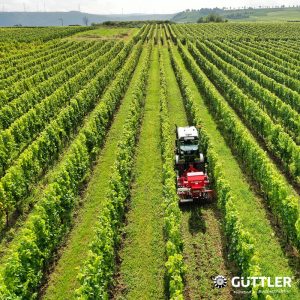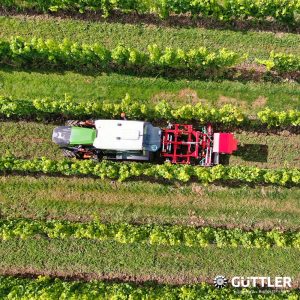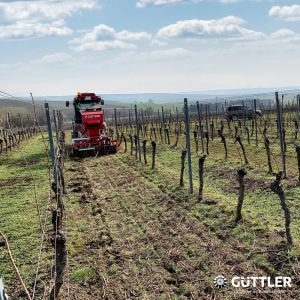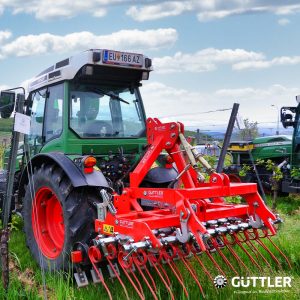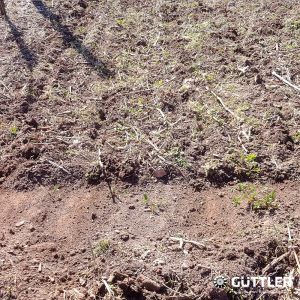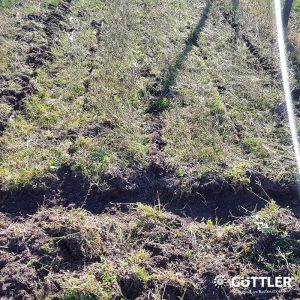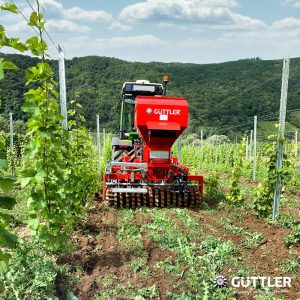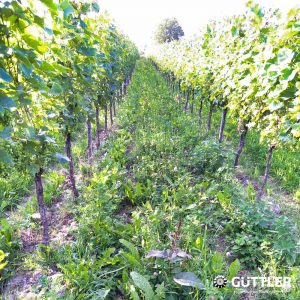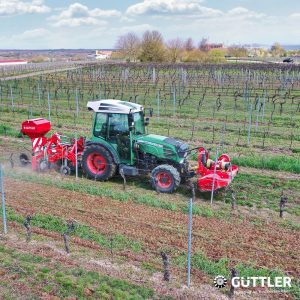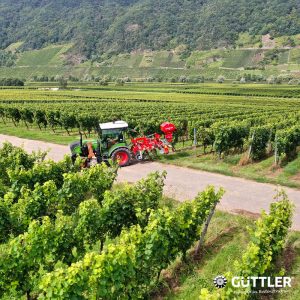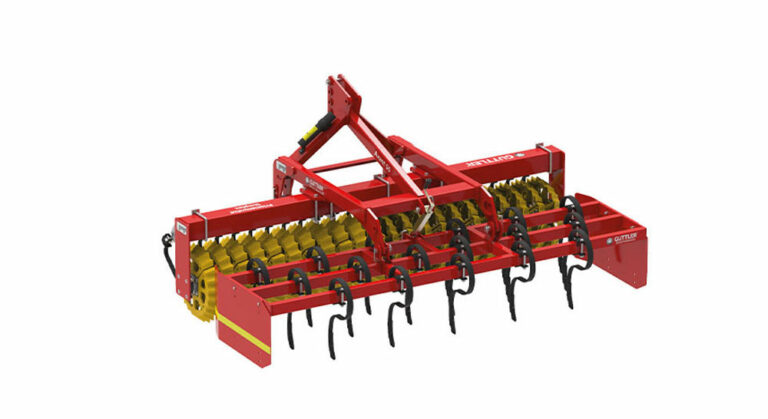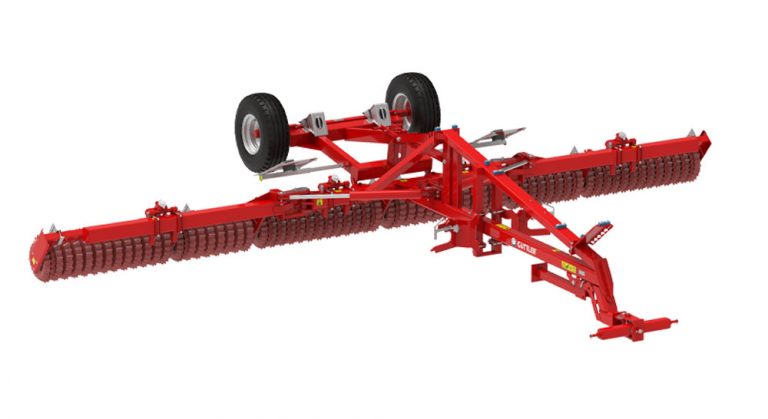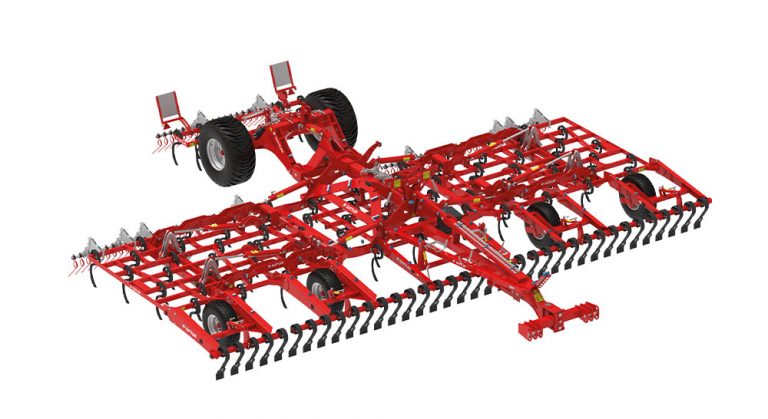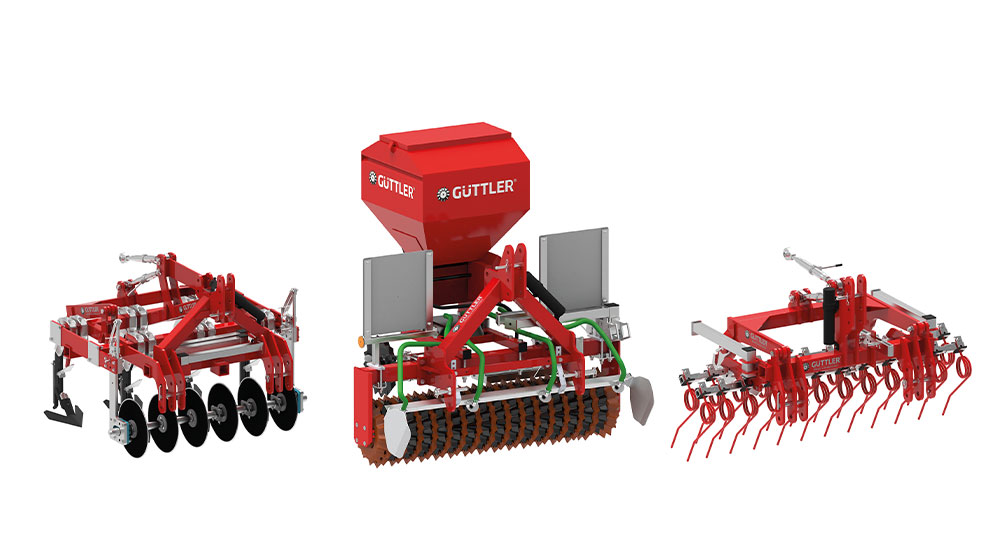
GreenManager®
Water regulating vegetation management and many applications. Our flexible cultivator-roller-harrow combination is the innovative solution for central tasks in viticulture and orcharding.
GreenManager®
TECHNOLOGY
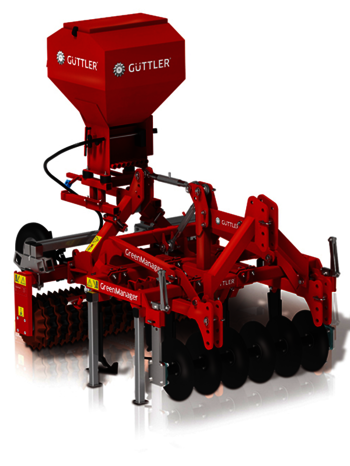
GreenManager®
Replant or reseed revegetation. Reduce competition from revegetation. Combined with HarroFlex harrow and/or leveling bar. Ideal for reseeding, maintenance and reseeding of turf. For viticulture and orcharding.
- Modular combi-system for flexible greening management
- Vineyard cultivator with cutting discs
- Self-cleaning prismatic roll® type Mediana in cast iron or lightweight semi-synthetic
- Pneumatic spreader EPS 5 with 200 l seed hopper, divided – with two separately adjustable seed rollers for simultaneous sowing of fine seeds and legumes
TECHNICAL DATA
| Type | Length | Weight |
|---|---|---|
| Example total GreenManager® 10 | ||
| Cultivator + prism roller Mediana + seeder „4+4“ | 2.23 m | 702 kg |
| Harrow + prism roller Mediana + seeder „4+4“ | 1.93 m | 598 kg |
| Example total GreenManager® 12 | ||
| Cultivator + prism roller Mediana + seeder „4+4“ | 2.23 m | 805 kg |
| Harrow + prism roller Mediana + seeder „4+4“ | 1.93 m | 708 kg |
| Example total GreenManager® 15 | ||
| Harrow + prism roller Mediana + seeder „4+4“ | 2.52 m | 1,005 kg |
| Harrow + prism roller Mediana + seeder „4+4“ | 1.93 m | 775 kg |
| Example total GreenManager® 18 | ||
| Cultivator + prism roller Mediana + seeder „4+4“ | 2.52 m | 1,174 kg |
| Harrow + prism roller Mediana + seeder „4+4“ | 1.93 m | 813 kg |
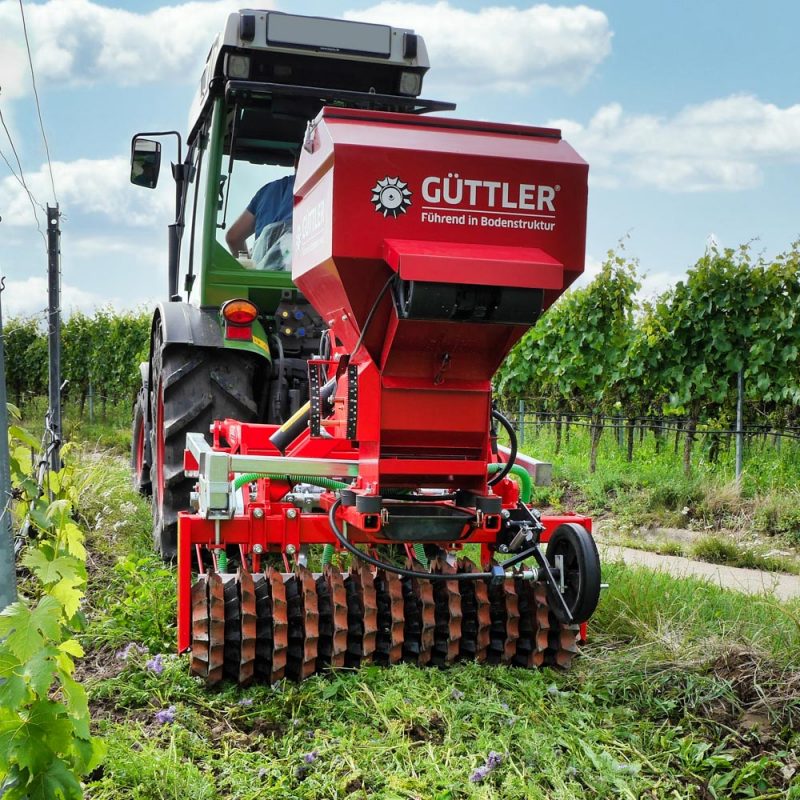
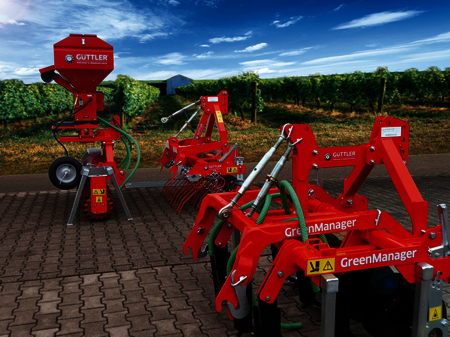
OPTIONS
PICTURES
VIDEOS
DOWNLOADS
Greening management - for better quality and yields in viticulture -Interview with Dr. Wilfried Hartl
Dr. Hartl, what do you see as the special challenges in viticulture?
Long-term in climate change. But also in the fluctuations of the weather within a year, such as 2014, for example, when it was first extremely dry and then cold and damp.
How can winegrowers and fruit producers respond successfully to these fluctuations?
The keyword here is “greening management.” The decisive factor is flexibility. Greening management must be targeted to the particular water balance, soil, and growth of the vine. Sometimes several times a year.
Together with GÜTTLER® and the floor workshop ertl-auer you have developed the GreenManager®. What’s new about it?
That this machine can do everything. It has a modular design and can be used flexibly. For example, to seed large-grain revegetation in the median strip of the driveway while undercutting the existing vegetation. Or to sow small-grain seeds throughout the tramline at the same time. Or only small-grain or only large-grain seed in the entire tramline width. This promotes good field emergence and saves seed.
This is called for when there is sufficient water in the soil. And during drought?
Then, competition from revegetation is reduced – by rolling down, repositioning or undercutting. And without risking erosion or loss of soil moisture due to intensive tillage.
How did the development cooperation with GÜTTLER® come about?
We have been working with the GÜTTLER® company for years because the motto “Leading in soil structure” is really lived there. To put it another way: GÜTTLER® machines contain a lot of brains per kilo of iron. Without this cooperation, our idea of a better machine for flexible greening management would never have become a product.
Dr. Wilfried Hartl has been working in crop production since 1980 and is deputy director of Bio Forschung Austria in Vienna. The expert for soil fertility and greening management in viticulture is the initiator for the development of the GreenManager®.
Greening management with the GreenManager® without erosion risk Dr. Wilfried Hartl, Dr. Eva Erhart, Bio Forschung Austria, Vienna
Climate change currently requires the rapid implementation of adaptation strategies in viticulture in order to ensure grape and wine quality at a high level and to avoid undesirable stress for the vines.
A decisive factor in this is the improvement of the water balance in the vineyards by increasing the water absorption capacity and the water storage capacity of the soils.
Greening in viticulture has a variety of positive effects: Soil cover and soil rooting directly counteract erosion. The addition of fresh organic matter through revegetation provides active soil life and improves soil structure and porosity. Species-rich revegetation enriches humus, reduces the monoculture effect of the vine, and stabilizes the vineyard ecosystem by increasing biodiversity.
However, these beneficial effects are countered by the concern that in very dry periods, water consumption by revegetation becomes competition for the vines. In very dry conditions, the vines may suffer from water shortage because the greening consumes too much water, while, however, in wet and cold weather periods, additional water consumption by greening has a positive effect on the vines.
Successful revegetation management must therefore be flexibly adapted to the water balance, soil and vine.
The “flexible revegetation management” developed by Bio Forschung Austria basically follows the principle that revegetation is allowed to develop luxuriantly if there is sufficient water supply, but that it must be reduced accordingly if there is a lack of water.
The strong-, medium- or weak-acting measures are carried out in doses, as required, by thinning out the greening and breaking the capillaries with the GreenManager® harrow, buckling the greening plants with the GreenManager® roller, or – in the case of drought stress – by completely stopping the water consumption by undercutting the greening a few centimeters below the soil surface with the GreenManager® cultivator.
The modular design of the GreenManger® equipment allows measures to be carried out that are precisely tailored to the respective soil conditions and growth phases of the vine.
The water balance of the vineyards is improved by this variety of possible measures, resulting in low-stress nutrition of the vines.
At all times, the soil remains covered with living or dead plant material and thus protected from erosion and receptive to precipitation.
With the GreenManager® seeder, cost-effective direct seeding of the next greening can take place either immediately during the reduction of the current greening or at a later date. The modular design of the GreenManager® system from Fa. Güttler allows simultaneous placement of large-grained seeds to a depth of 7cm, while fine-grained seeds are placed only shallowly into the seedbed. A good emergence of the seed is thus made possible and the costs for seed and sowing can be kept low.
The innovative modular design of the GreenManager® devices enables cost-effective implementation of flexible greening management in practice. This not only improves the fundamentals of viticulture and wine quality, but also successfully implements an ecological and economic adaptation strategy for climate change in viticulture.
For further questions, please contact Dr. Hartl at w.hartl@bioforschung.at


